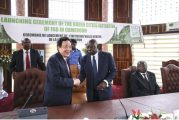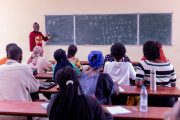Categories
Recent Posts
- Southern Cameroons refugees in Nigeria receive farm seedlings
- Douala: Investment Forum wraps up with honors for investment champions
- Understanding the Biya Francophone regime’s support for the Israeli genocide in Gaza
- US: Prosecution lays out ‘criminal conspiracy’ as Trump’s hush money trial opens
- FAO formally launches Green Cities Initiative in Cameroon
Archives
- April 2024
- March 2024
- February 2024
- January 2024
- December 2023
- November 2023
- October 2023
- September 2023
- August 2023
- July 2023
- June 2023
- May 2023
- April 2023
- March 2023
- February 2023
- January 2023
- December 2022
- November 2022
- October 2022
- September 2022
- August 2022
- July 2022
- June 2022
- May 2022
- April 2022
- March 2022
- February 2022
- January 2022
- December 2021
- November 2021
- October 2021
- September 2021
- August 2021
- July 2021
- June 2021
- May 2021
- April 2021
- March 2021
- February 2021
- January 2021
- December 2020
- November 2020
- October 2020
- September 2020
- August 2020
- July 2020
- June 2020
- May 2020
- April 2020
- March 2020
- February 2020
- January 2020
- December 2019
- November 2019
- October 2019
- September 2019
- August 2019
- July 2019
- June 2019
- May 2019
- April 2019
- March 2019
- February 2019
- January 2019
- December 2018
- November 2018
- October 2018
- September 2018
- August 2018
- July 2018
- June 2018
- May 2018
- April 2018
- March 2018
- February 2018
- January 2018
- December 2017
- November 2017
- October 2017
- September 2017
- August 2017
- July 2017
- June 2017
- May 2017
- April 2017
- March 2017
- February 2017
- January 2017
- December 2016
- November 2016
- October 2016
- September 2016
- August 2016
- July 2016
- June 2016
Featured
 Understanding the Biya Francophone regime’s support for the Israeli genocide in Gaza
Understanding the Biya Francophone regime’s support for the Israeli genocide in Gaza  Poverty under Biya: Cameroonians embrace Chinese language for brighter futures
Poverty under Biya: Cameroonians embrace Chinese language for brighter futures  Cameroon is broken: Who can fix it?
Cameroon is broken: Who can fix it?  Ethiopia: U.S Senator Cardin Statement on the Killing of Bate Urgessa
Ethiopia: U.S Senator Cardin Statement on the Killing of Bate Urgessa  Battle for the Unity Palace: ANNOUNCEMENT!
Battle for the Unity Palace: ANNOUNCEMENT!
Most Commented Posts
 4 Anglophone detainees killed in Yaounde
4 Anglophone detainees killed in Yaounde
19 comments Chantal Biya says she will return to Cameroon if General Ivo Yenwo, Martin Belinga Eboutou and Ferdinand Ngoh Ngoh are sacked
Chantal Biya says she will return to Cameroon if General Ivo Yenwo, Martin Belinga Eboutou and Ferdinand Ngoh Ngoh are sacked
13 comments Anglophone Nationalism: Barrister Eyambe says “hidden plans are at work”
Anglophone Nationalism: Barrister Eyambe says “hidden plans are at work”
12 comments The Anglophone Problem – When Facts don’t Lie
The Anglophone Problem – When Facts don’t Lie
12 comments Largest wave of arrest by BIR in Bamenda
Largest wave of arrest by BIR in Bamenda
10 comments
Latest Tweets
Featured
-

Southern Cameroons refugees in Nigeria receive farm seedlings
-

Douala: Investment Forum wraps up with honors for investment champions
-

Understanding the Biya Francophone regime’s support for the Israeli genocide in Gaza
-

US: Prosecution lays out ‘criminal conspiracy’ as Trump’s hush money trial opens
-

FAO formally launches Green Cities Initiative in Cameroon
-

Football: Barcelona wants Clasico replay if Yamal ‘ghost goal’ call wrong
-

Poverty under Biya: Cameroonians embrace Chinese language for brighter futures
© Cameroon Concord News 2024
21, May 2018
20th May hit by violence in Southern Cameroons 0
Cameroon’s national day Sunday was marked by violence in its troubled English-speaking region, with two policemen killed, soldiers wounded and a mayor kidnapped by suspected armed separatists.
In the capital, Yaounde, in central Cameroon, President Paul Biya, who has ruled since 1982, presided over a public show of the country’s military might.
But in the English-speaking town of Bangem in southwest Cameroon, the mayor, Ekuh Simon, was kidnapped. In a video shared by suspected armed separatists Simon said he and his deputy were kidnapped by separatists for planning independence celebrations. He said he is being held hostage by the Ambazonia Restoration Forces that had said the national day should not be celebrated. Ambazonia is the name separatists have given to the English-speaking area they want to become independent from French-speaking Cameroon.
Fighting was also reported in the English-speaking towns of Konye, Batibo, Ekona and several villages of Kupe Muanenguba, an administrative area in southwestern Cameroon.
At least two policemen and several people were killed, according to the governor of the south west region Bernard Okalia Bilai. In the towns that were attacked, many escaped to the bushes and safer neighboring towns.
In the northwestern city of Bamenda, there was a strong show of force to prevent any violence, but only a few residents turned up for the celebrations, saying that they feared retaliation from the separatists. Some students at the University of Bamenda showed up for the parade, saying they were forced by officials to come under the penalty of expulsion. Government officials also said they were also forced to come.
The Cameroon government had asked the population to come out in numbers and celebrate the national day as a sign of national unity adding that the military will protect the people from armed separatists who had vowed the day will not be celebrated in the English-speaking regions.
Cameron again imposed a curfew on its English-speaking regions. In spite of the curfew and heavy presence of the military, the armed separatists were able to chase out some public officials and close some schools.
Both the government and separatists have committed abuses, according to the U.S. ambassador. Ambassador Peter Henry Barlerin last week met with Biya and urged the president to initiate dialogue to lead the way out of violence.
“On the side of the government, there have been targeted killings, detentions without access to legal support, family, or the Red Cross, and burning and looting of villages. On the side of the separatists, there have been murders of gendarmes, kidnapping of government officials, and burning of schools,” said Barlerin in a statement issued after he met with Biya. “People on both sides of the conflict have engaged in speech that dehumanizes the opposite side.”
International humanitarian organizations and rights groups have accused the government of harsh measures in its crackdown and the indiscriminate arrests of suspects.
Unrest in Cameroon began in November 2016, when English-speaking teachers and lawyers in the northwest and southwest regions took to the streets, calling for reforms and greater autonomy. They expressed frustration by the dominance of the French-speaking parts of the country and with what they charged is the marginalization of Cameroon’s Anglophone population. Cameroon’s English-speaking community accounts for about one-fifth of the country’s 25 million people.
The protests were followed by a harsh government crackdown, including arrests and a shutdown of the internet.
The crisis intensified when Ayuk Tabe, who declared himself the president of the English-speaking Republic of Ambazonia, was arrested in December with 48 others in Nigeria and extradited to Cameroon. They have not been seen in public since. The separatists are demanding his immediate release.
The separatists have chased many government workers and forced the closure of man schools, timber and palm oil processing factories. They vowed on social media to paralyze the country until they Ayuk Tabe and his colleagues are released.
Parts of southwest Cameroon remain under a curfew because the separatists continue to commit atrocities, said Bernard Okalia Bilai, governor of the Southwest Region
“The gunmen are hiding in the bushes, in the forests and usually they would appear on the roads to try to kidnap some passengers,” said Bilai. He said security information indicates most of the armed separatists are hiding in the bush along Cameroon’s southwestern border with Nigeria, especially in the Manyu and Lebialem administrative areas.
Source: News wpxi.com